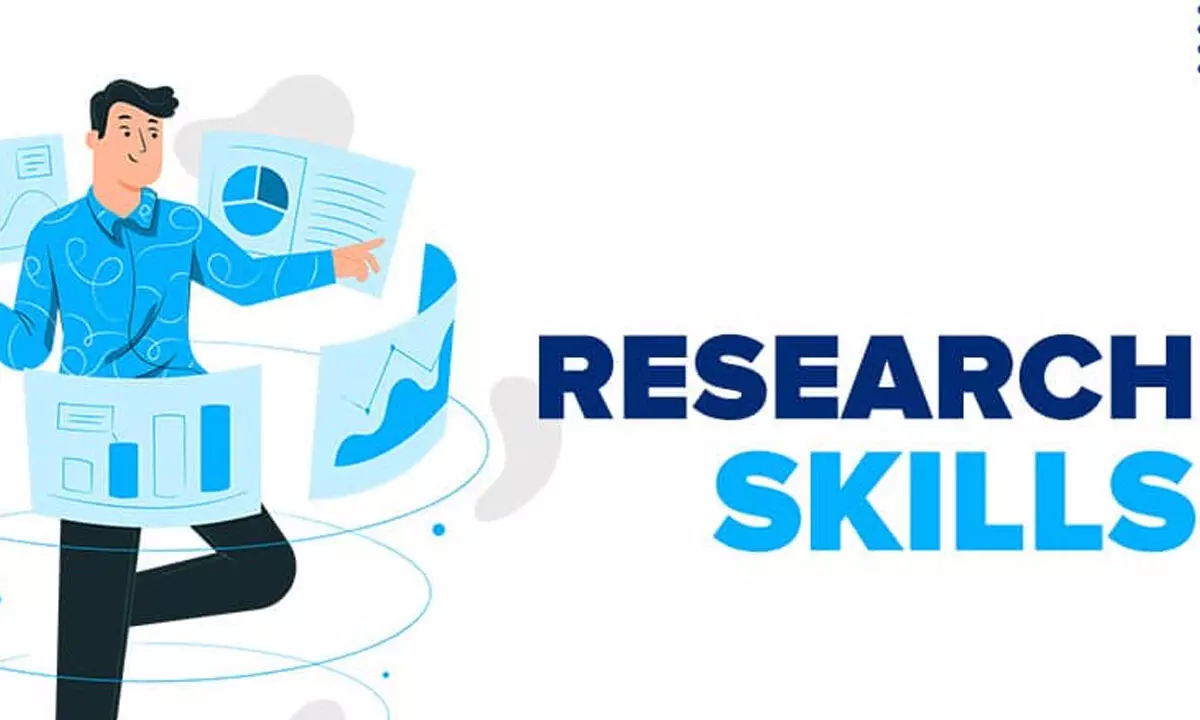Live
- Cong won all 3 seats on basis of guarantees, development: Dy CM on K’taka bypolls
- Santosh Trophy: Odisha rout Chhattisgarh to make final rounds
- BJP hijacked electoral machinery for securing victory in Maharashtra: Cong
- Formula 1: Russell pips Sainz to take pole in Las Vegas GP
- India under Trump 2.0 could bolster its position in global supply chains
- People voted for ideology, rejected dynasty: Sudhanshu Trivedi on Maha victory
- AP, Telangana to receive rains for next three days as low pressure to turn depression
- Kailash Gahlot inducted into BJP’s Delhi election panel
- With state elections over, Indian stock market heads for stability
- Mahayuti's Ladki Bahin Brahmastra demolishes MVA in Maharashtra
Just In

Research is a cornerstone of academic success, and developing strong research skills is essential for students at all levels of education.
Research is a cornerstone of academic success, and developing strong research skills is essential for students at all levels of education. Whether it's for writing a paper, preparing a project, or contributing to scholarly knowledge, research enables students to gather, evaluate, and synthesize information effectively. The ability to conduct sound research is crucial not only for academic purposes but also for making informed decisions in everyday life. Here are some of the most important research skills students should master.
Defining a clear research question or topic
The first step in any research process is to clearly define what you are researching. This involves formulating a focused question or topic that is neither too broad nor too narrow. A well-defined research question helps guide the research process and keeps the student focused on relevant information. For instance, instead of researching "climate change," a more refined topic might be "the impact of climate change on agricultural practices in sub-Saharan Africa." This precision helps ensure that the research remains targeted and relevant.
Identifying and using reliable sources
In the age of information overload, students must be adept at identifying credible and reliable sources. Not all information on the internet is accurate or trustworthy, and being able to differentiate between peer-reviewed academic journals and opinion pieces is a critical skill. Students should rely on reputable databases, libraries, and scholarly publications. Evaluating the authority, accuracy, and relevance of sources is vital to maintaining the integrity of the research. Learning to cross-check information from multiple sources is another important aspect of ensuring credibility.
Effective use of search tools
Knowing how to use various research tools effectively can significantly improve the efficiency of the research process. Academic databases like JSTOR, PubMed, or Google Scholar provide access to peer-reviewed journals and scholarly articles, making them invaluable resources. Mastering advanced search techniques—such as using Boolean operators (AND, OR, NOT), filters, and keyword combinations—can help students narrow down search results and find the most pertinent information quickly.
Critical thinking and analysis
Once information is gathered, students must analyze it critically. Critical thinking involves evaluating the arguments presented in the sources, identifying biases, and assessing the quality of evidence. This process ensures that students are not passively consuming information but are actively engaging with it. By asking questions such as, “What is the evidence supporting this claim?” or “Is this argument logically sound?” students develop deeper insights into their research topics.
Organising information
Efficient organisation of data is key to a successful research process. Students should learn to categorize and structure their information in a way that makes it easy to reference and integrate into their work. Tools like digital note-taking apps (e.g., Evernote, Notion) or citation management software (e.g., Zotero, Mendeley) can help in keeping track of sources and organising information systematically. A clear organizational structure not only aids in writing but also makes the research process less overwhelming.
Time management
Research can be time-consuming, and students must manage their time effectively to meet deadlines. Breaking down the research process into manageable steps—such as topic selection, literature review, note-taking, drafting, and revision—can help students stay organized and avoid last-minute stress. Allocating specific time slots for each stage of the research process ensures steady progress and prevents burnout.

© 2024 Hyderabad Media House Limited/The Hans India. All rights reserved. Powered by hocalwire.com







